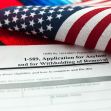The new national security law passed by China for the Hong Kong region this past June has been the catalyst for a growing exodus of Hong Kong activists and protestors from the city.
The law, which was kept secret until after it was passed, has 66 articles. The articles span a broad range of topics and include criminalizing acts like secession of any sort, undermining the power and authority of the central government, terrorism, and colluding with foreign or external forces.
The new measures set by the national security law have been met with intense backlash by citizens of the Hong Kong region because they strictly reduce freedom of speech, specifically the freedom to protest and be critical of the Chinese government. One of the more contentious articles in the law, article 38, stipulates that the law applies to anyone who is not a permanent resident of Hong Kong and even those who don't live there. The article gives the notion that the law applies to virtually anyone in the world. The BBC recently reported that this specific article has made students wary of traveling to the area due to the potential backlash of inadvertently criticizing the region's government.
Many groups, including Amnesty International, have highlighted the regression of this new law and its draconian expectations. Because it is overly vague and incredibly broad, it makes it easy for virtually any act to be deemed a threat to national security. The Chinese government has pushed back, stating that the new law will restore stability in the country.
New Law Leads to Rise in Arrests and an Exodus in Residents
The new measures outlined in the law immediately went into effect, and a slew of arrests for seemingly minor acts followed. Many people have even deleted their social media accounts, including Facebook, in fear of violating the law and being met with opposition, which usually includes jail time. Activists and protesters have specifically been the target of the new law, with many being arrested for expressing their disapproval of the government. According to Amnesty International, this new national security law has the potential to override basic human rights.
Backlash From Hong Kong Residents
Unsurprisingly, the new law has sparked controversy among those living in Hong Kong. With an increase in arrests due to violations of the law, Hong Kong has seen an exodus of individuals fleeing the region.
One such individual is former lawmaker Sixtus Leung. Leung, a young activist and politician in Hong Kong, promoted his idea of independence for the Hong Kong region and had quite a following. He was elected to the Legislative Council of Hong Kong, where his appointment with the government was short-lived as his credibility as an elected lawmaker was called into question. In May of this year, the Legislative Council Commission stripped Leung of his office and required him to pay back HK$930,000 (US $120,000) For wrongful salary payment.
On November 30, Leung arrived in the U.S. seeking asylum after fleeing from the city because of fears surrounding his political views and the new national security Law. In an interview with the Wall Street Journal, Leung explained, “Everybody in my circle is frightened,” referring to the current climate. Leung is just one of many Hong Kong citizens seeking asylum in the U.S. and abroad.
Leung’s safe refuge in the states came just two months after 12 dissidents escaped on a speedboat from a Hong Kong port. Their destination was Taiwan, 400 miles away. However, the 12 individuals were not successful as the Chinese Coast Guard intercepted them just outside of Hong Kong waters, where they were detained and jailed.
Another Hong Kong lawmaker, Ted Hui, has also fled the city and is now exiled in Great Britain, another safe haven for those fleeing Hong Kong. Hui was a high profile activist and a target of the Chinese government as he was brought into court several times in Hong Kong to face charges related to the anti-government protests he organized and led.
Not long after Hui posted news of his exile on Facebook, the Chinese police froze his bank accounts. The police accuse Hui and his wife of illegal activities, including embezzlement, but the couple has denied such allegations and has been transparent with their bank records, audits, and other financial documents.
Like so many who have managed to flee, Leung and Hui are reviving their efforts to restore freedom for protesters and activists now that they are on safe soil.
A Mixed International Response
There have been mixed reactions coming from the international community regarding the tightening of restrictions in Hong Kong. The United Kingdom, the United States, Australia, Canada, New Zealand, Japan, and Thailand, have expressed their opposition to the law, with other countries, including Taiwan and Germany, accepting asylum seekers. Cuba, along with 52 other countries, however, shared their support of the new security law.
As countries continue to accept the growing number of asylum seekers, tensions are beginning to grow between China and nations that are doing so.
The U.S. has made its opinion clear on the situation with Secretary of State Mike Pompeo expressing his support and continued efforts to protect activists in Hong Kong. President-elect Biden’s national security advisor, Jake Sullivan, has also expressed his support through a Twitter statement that reads, "I'm deeply concerned about the continuing arrests and imprisonment of pro-democracy activists in Hong Kong. We stand united with our allies and partners against China's assault on Hong Kong's freedoms—and to help those persecuted find safe haven.”
The Chinese Foreign Ministry has expressed its disapproval of nations that are supporting activists who are fleeing the city, especially since many have fled and are not facing criminal charges for previous protests.






